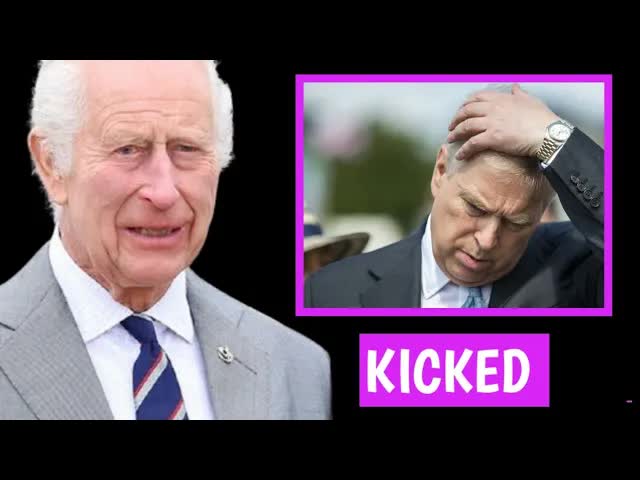Prince Andrew, the Duke of York, has found himself at the center of a royal upheaval that marks a significant fall from grace.
Once a cherished member of the British royal family, he has been ousted from the Royal Lodge, his long-standing residence, in a decision made by none other than his brother, King Charles III.
This shocking development has sent ripples through royal circles and left the public divided over the fate of the once-beloved prince.
How did it come to this?
What led to such a dramatic decline for a man born into privilege?
Born in 1960 to Queen Elizabeth II and Prince Philip, Prince Andrew was initially celebrated as a royal favorite.
He was the first child born to a reigning monarch in over a century, and from an early age, he enjoyed a special place in the royal family.
His upbringing followed a traditional path, featuring an education at Gordonstoun and later service in the Royal Navy, where he gained admiration as a helicopter pilot during the Falklands War.
His marriage to Sarah Ferguson in 1986 further solidified his status, as the couple became media darlings and appeared poised for a lifetime of royal duties.
However, the idyllic image of Prince Andrew and Sarah Ferguson quickly crumbled.
By the early 1990s, their marriage faced challenges, leading to a divorce in 1996.
Although they remained on good terms, Andrew’s reputation began to suffer as he became embroiled in various controversies.
Sarah’s financial scandals cast a shadow over him, and soon after, his connections to convicted s offender Jeffrey Epstein came to light, marking the beginning of a downward spiral.
The turning point came in 2019 with a disastrous BBC interview.
Attempting to clarify his relationship with Epstein, Andrew’s lack of remorse and bizarre explanations only intensified public scrutiny.
His claims of being unable to sweat due to a medical condition and the infamous alibi involving a pizza restaurant were widely ridiculed.
Following the fallout, he announced a retreat from public life in early 2020, relinquishing his royal patronages and charitable roles.
Legal troubles compounded Andrew’s woes when Virginia Giuffre filed a lawsuit against him in 2021, accusing him of sual abuse.
Although he denied the allegations, the scandal continued to tarnish his image.
In early 2022, Andrew settled the lawsuit out of court for millions, a move that, while not an admission of guilt, further damaged his reputation.
Financially strained and without the support of his late mother, Andrew faced an uncertain future.
The death of Queen Elizabeth II in 2022 ushered in a new era for the monarchy, with King Charles III taking the throne.
Charles has expressed a desire to modernize the royal family, focusing on a streamlined monarchy that includes fewer working royals.
This shift, however, has left little room for Andrew, whose scandals have become a liability for Charles’ vision of a clean, respectable monarchy.
The eviction from the Royal Lodge represents a final blow for Prince Andrew.
Once a symbol of his royal ties, the lodge is now a reminder of his fall.
While he was offered alternative accommodations, the message from King Charles was clear: no one, not even family, receives special treatment.
This decision reflects a broader effort to distance the monarchy from scandalous figures and maintain a polished public image.
The relationship between Prince Andrew and King Charles has long been strained.
Their differing views on royal responsibilities have fueled tension, especially as Charles has taken on more duties.
The eviction signals a decisive move by Charles to protect the monarchy’s reputation, even at the cost of familial bonds.
It underscores the reality that the monarchy must be seen as accountable and responsible, particularly in the face of public scrutiny.
As Prince Andrew’s royal duties evaporate and his legal battles conclude, questions loom about his future.
Will he retreat from the public eye entirely, or will he attempt to rebuild his life?
For now, he seems to be keeping a low profile, supported by his daughters, Princess Beatrice and Princess Eugenie, as well as his ex-wife, Sarah Ferguson.
However, with King Charles committed to a more modern and cost-effective monarchy, Andrew’s days of royal engagement appear to be over.
The impact of Andrew’s downfall extends beyond his personal life; it raises significant questions about the future of the British monarchy itself.
Public opinion is divided, with some viewing Andrew’s eviction as a necessary step towards accountability.
Others, however, argue that he has already suffered enough and should not be punished further.
The royal family’s financial arrangements are also under scrutiny, as many wonder if taxpayer money should support royal luxuries.
Media coverage has played a crucial role in shaping public perception of Prince Andrew’s fall.
The British tabloids have relentlessly pursued his story, often amplifying the negative aspects of his life.
While some argue this scrutiny is warranted, others contend that it hinders any chance of redemption for the prince.
As King Charles navigates the fallout from these scandals, the royal family must manage its public relations carefully to maintain its dignity.
Prince Andrew’s saga serves as a cautionary tale for the monarchy, highlighting the importance of accountability and transparency.
In an era where royal privileges are increasingly questioned, the actions of individual royals can have far-reaching consequences.
King Charles’ swift decision to distance the monarchy from scandal signals a commitment to a new direction—one that prioritizes public perception and responsibility over familial ties.
As we look ahead, the question remains: what does the future hold for Prince Andrew?
With his royal duties stripped away, finances in disarray, and a tarnished reputation, he faces an uncertain path.
His eviction from the Royal Lodge marks a definitive end to his royal privileges, ushering in a new chapter that reflects the changing dynamics of the British monarchy.
The road ahead may be challenging, but it is clear that the era of unquestioned royal entitlement is fading fast.
Related Stories

